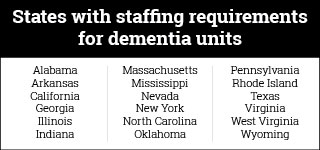
Training requirements for residential care workers vary dramatically across the nation, a new report finds. Ten states have no rules on the books. Among the 40 that do, the number of required hours ranges from one to 80, according to a compendium from the Office of the Assistant Secretary for Planning and Evaluation.
Investigators found notable differences in virtually every area they examined. For example, only 23 states require people who work in dementia care settings to receive any orientation or training.
States also lack uniformity when it comes to general training topics. In Illinois, training must address the following: encouraging independence in and providing ADL assistance; emergency and evacuation procedures specific to the dementia population; techniques for successful communication and minimizing challenging behaviors; residents’ rights and choice for persons with dementia; and caregiver stress and working with families. In other states, nothing need be done.
The compendium also notes various ways states view assisted living. Some refer to the settings as a service, while other prefer agency.
The report’s findings are based on a 2012 study conducted by the National Center for Health Statistics. In all, the United States has an estimated 22,200 residential care settings with 713,300 residents. Just over half of settings with 50 or more units had a dementia care program or unit, while 52% percent were certified to receive Medicaid funding.



